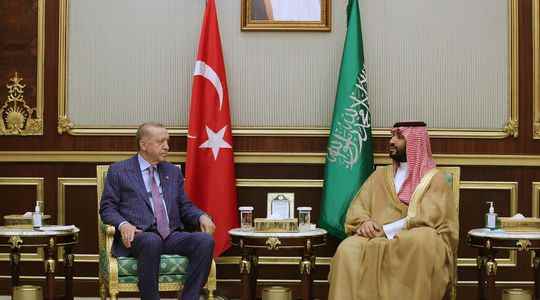EUROPEAN UNION
Frontex boss resigns
Questioned by the European Anti-Fraud Office for his management of the European coastguard agency Frontex, the Frenchman Fabrice Leggeri presented his resignation on April 29. “For months, the boss of Frontex had tried to conceal the illegal refoulement of refugees in the Aegean Sea and the role played by his own staff”, remember Der Spiegelwhich revealed several of these “pushbacks”.
The agency, which should have 10,000 employees by 2027, must make “a new start” by now protecting “people and not just borders”, believes the weekly.
POLAND AND BULGARIA
Russia shuts off the gas
The sanction fell on April 27 for Warsaw and Sofia, who refused to pay in rubles their Russian gas supply. Moscow has closed the floodgates until further notice. According to Andrei Belyi, an energy specialist at the University of Eastern Finland, questioned by the FinancialTimesthe Kremlin thus intends to show that it is ready “to punish those who want to gradually eliminate Russian natural gas”.
In the short term, however, Poland and Bulgaria have sufficient reserves and are counting, for the future, on gas coming from the United States and Azerbaijan, as well as on European solidarity.
UNITED STATES
33 billion for Ukraine
The American president asked Congress, on April 28, for a considerable increase in aid to Ukraine to the tune of 33 billion dollars until next September 30. Objective: to allow this country to beat Russia. “Most of the request is for military assistance, $20 billion, to provide arms to Ukraine, replenish US arms stockpiles and help other countries to no longer depend on Russian weapons”, details the site of the American public radio NPR. The remaining amount concerns economic aid, food security and humanitarian aid, including for Ukrainian refugees.
SAUDI ARABIA
Erdogan reconnects with MBS
The Turkish president visited Saudi Arabia on April 28 for the first time since the 2018 assassination of Saudi journalist Jamal Khashoggi at the kingdom’s consulate in Istanbul. Recep Tayyip Erdogan met the King and Crown Prince Mohamed bin Salman (MBS) there. In the midst of the economic crisis in Turkey and one year before the general elections, “Erdogan seems to be playing his all on the international scene” analysis Middle East Eye.
As proof, he has “significantly softened his ties with former rivals, such as Egypt and Israel, and especially the oil-rich Gulf monarchies, including Saudi Arabia and the United Arab Emirates”.
GUINEA
An extended transition
It is decided, the junta will not return power to civilians before 2025. The putschists, who overthrew President Alpha Condé in September 2021, decided on May 1 on the duration of the transition: 39 additional months. Too bad for the Economic Community of West African States (ECOWAS), which demanded the organization of elections within six months after the coup. “Should we laugh or cry? In any case, we should, logically, be worried about it!” writes the site Wakat Seraat a time when “democracy is taking a beating” in West Africa, hit by an epidemic of putschs.
UKRAINE
Kyiv bombed during Guterres visit
New provocation from Moscow. kyiv was the target of Russian strikes on Thursday, April 28, during the visit of UN Secretary General Antonio Guterres. This bombardment, the first on the capital since mid-April, caused the death of a Ukrainian journalist from Radio Liberty and injured a dozen people.
“The Russian strike took place barely an hour after a press conference held by Ukrainian President Volodymyr Zelensky with Antonio Guterres, who noted the destruction in kyiv and its outskirts, and condemned the attacks against civilians”, notes Politico.
INDIA AND PAKISTAN
The thermometer panics
An unprecedented heat wave hits the two South Asian countries and pushes the thermometer to record highs. On April 29, it rose to 46°C in many Indian cities, while in neighboring Pakistan, a peak of 47°C was recorded the same day. “Heat waves can have serious health consequences. […] Even at night, the body does not have the possibility of recovering”, specifies with the BBC Dr. Chandni Singh, researcher at the Indian Institute for Human Settlements, who blames global warming.
